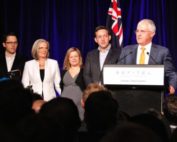A prayer for those in poverty
This prayer is designed for use in a worship gathering of a Christian assembly. By praying for those in poverty, we can help to shape our thinking about those in poverty in ways which are compassionate and Christian. This prayer is adapted for use in an Australian context from a prayer composed by Janet Eriksson. A prayer for those in poverty God of justice, We bring before you those who are living in poverty in
What Christians must require of Malcolm Turnbull
When Prime Minister Malcolm Turnbull took to the podium to speak on the night of the Federal election, there are a number of things he could have said that wouldn't have been surprising at all. What he did say was very surprising. I can report that based on the advice I have from the party officials we can have every confidence that we will form a Coalition majority government in the next parliament (source). This
Freedom of speech, censorship, and the gospel
Note: I first started writing this post over two years ago, but never published it. Since the advent of the Charlie Hebdo massacre and subsequent hot debates about cartoon depictions, religious expression, and equating Christian and Muslim extremism, I have decided to finish and post it. Principles of free speech One of the great principles of the Free World is freedom of speech. "I disapprove of what you say, but I will defend to the
Christians and war: The innocence of horror
War is hell. At least that's what those who've seen it say. If my vicarious experiences of war via Hollywood are anything resembling realistic, I'm inclined to agree. Many Christians over the years have considered themselves pacifists. I do not count myself among them. Still, there is something fundamentally broken about war. No other human dynamic is so perfectly tuned to bring out the worst—occasionally the best, but usually the worst—in human nature. I remember
So how is that working out for you?
A large benefit of my faith in Christ, is that it helps me make sense of this world. As a follower of Jesus and his teachings, I realise a few critical points. 1) I am a sinner, along with everyone in this world. 2) Our sin explains the evil things that happen in this world. 3) Without Christ, there is no hope for change in this world or the next. So… When I look at
Politics
I am unashamedly non-partisan. I swing at the ballot box because I love truth and justice more than any party. Every election is a complex calculus of multitudinous factors and disparate likely outcomes assessed pragmatically with the engagement of my mind, my heart, and my conscience. You’ll see me critique and affirm both sides of politics based on whether I think what they are doing is good or bad, admirable or detestable. I would love to convince you to be a swing-voter too.
Legal reform
The following are some key areas in which I want to see legal reform. These are based on my observations in helping the vulnerable. I have sought to give an indication of the particular jurisdiction I have in mind. That said, I want to see progress on these issues across all jurisdictions.
If I can help you or you can help me progress any of these causes, please don’t hesitate to contact me.





